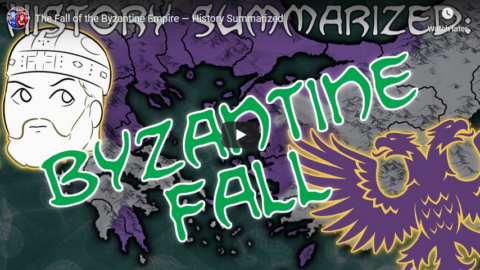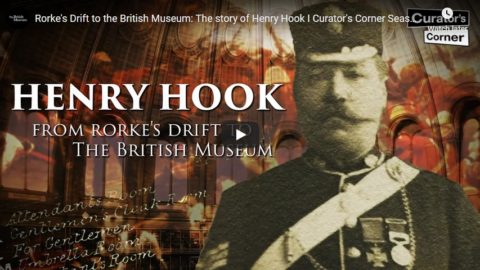Overly Sarcastic Productions
Published 4 Dec 2020At long last, the concluding chapter of Roman history! Let’s tie the bow on Byzantine Constantinople as the empire comes to an end, slightly earlier than we might think, but far later than anybody ever could have expected.
SOURCES & Further Reading: Byzantium: The Decline and Fall & A Short History of Byzantium by John Julius Norwich, Osman’s Dream by Finkel, https://www.ancient.eu/Despotate_of_t…
This video was edited by Sophia Ricciardi AKA “Indigo”. https://www.sophiakricci.com/
Our content is intended for teenage audiences and up.
PATREON: https://www.Patreon.com/OSP
PODCAST: https://overlysarcasticpodcast.transi…
DISCORD: https://discord.gg/osp
MERCH LINKS: http://rdbl.co/osp
OUR WEBSITE: https://www.OverlySarcasticProductions.com
Find us on Twitter https://www.Twitter.com/OSPYouTube
Find us on Reddit https://www.Reddit.com/r/OSP/
December 5, 2020
The Fall of the Byzantine Empire — History Summarized
The “new normal” will, by definition not be “normal”
At Spiked, Brendan O’Neill cries “Down with the New Normal!”

“Covid 19 Masks” by baldeaglebluff is licensed under CC BY-SA 2.0
Few phrases inspire more horror in me than “the new normal”. It is falling from the lips of public-health experts and lockdown-loving commentators everywhere. Forget the “old normal” of going maskless into the streets, or ramming yourself into a crowd of thirsty punters at the bar in a pub, or taking a lover without constantly worrying that he or she might make you ill with his or her breath. Such reckless libertinism was for the old world, apparently, the era BC (Before Covid). We are all now heading into the New Normal, a brave new world of forever social-distancing being built for us by a benevolent bureaucracy that simply wants to protect us from disease.
Everywhere you turn there is talk of the new normal. Out will go bare faces, hand-shaking, hugs and sweaty crowds, and in will come masks, elbow-bumping, and sitting six feet away from everyone else at concerts and shows. Bye bye, mosh pits. Yes, even when the vaccine comes, which is when many of us hoped we would see our freedoms restored, the uber-cautious habits we have developed during the Covid crisis should continue, experts say. Jonathan Van-Tam, England’s deputy chief medical officer, said this week that these “habits”, including face-covering, should continue for “many years”. Better safe than sorry, eh?
Van-Tam isn’t alone. Many experts and commentators are predicting, and even welcoming, a decline in social engagement and physical contact as we head into the new normal. “The Coronavirus killed the handshake and the hug — what will replace them?”, asks Time magazine, blissfully unaware of how mad it sounds. “Hugs, high fives, fist bumps, back pats [and] shoulder squeezes” could all disappear after 2020, Time predicts. And it talked to one of many experts who thinks that’s no bad thing. Dr Mark Sklansky, an American cardiologist, told Time he has always hated hand-shaking. “Hands are warm, they’re wet, and we know that they transmit disease very well”, he said. But where “being anti-handshake was fringe thinking” in the past — !! — it is now increasingly common to be handshakephobic, says the wise doctor. Put your wet, diseased paws away, everyone.
And the new normalists are not letting the imminent rolling-out of the vaccine puncture their dreams of a world without clammy handshakes and other forms of sickness-spreading human contact. People expecting to be “back to normal by spring” are “expecting too much” of the vaccine, said a British microbiologist a couple of weeks ago. Even with a vaccine, “we will not be returning to the old normal”, decrees the Lancet. No, apparently “physical distancing and hand hygiene must continue indefinitely”. Maybe these doom-mongers are keen on physical distancing because they know a lot of people would probably like to give them a clout for their miserabilism?
Rorke’s Drift to the British Museum: The story of Henry Hook I Curator’s Corner Season 4 episode 5
The British Museum
Published 12 Nov 2018Henry Flynn recounts the story of Alfred Henry Hook VC, a private in B Company of the 2nd Battalion, 24th Regiment of Foot who served at the battle of Rorke’s Drift before becoming an employee of the British Museum.
From the comments:
shoutinghorse
1 year ago
When the movie Zulu was premiered in 1964 in London descendants of some of the characters were invited to attend including Henry Hook’s two daughters, (5:53) they were elderly ladies by then and were so horrified at the portrayal of their father as a malingering drunken thief that they walked out in disgust. In real life Hook was an honest soldier and a teetotaller. The producers of the film later issued an a apology to the Hook family.
QotD: The end of Jazz as popular music
There is a moment at the end of Art of the Trio 4, a live album released last year by 28-year-old pianist Brad Mehldau, when the problem with contemporary jazz is crystallized. After a seemingly endless set displaying his pyrotechnic virtuosity, Mehldau slides into Radiohead’s “Exit Music (For a Film).” He plays the song straight, his suddenly spartan piano style capturing the rich, chilling vocal melody. There’s no endless jamming, no fearful retreat into what has become the classicism of legends like Thelonious Monk, John Coltrane, Charlie Parker, and Dizzy Gillespie — just a simple embrace of a brilliant pop song, like Sinatra doing Mercer or Ella singing Ellington.
It was a rare moment of clarity in jazz, and as such revealed a certain hollowness to the rest of the album. Jazz has become sadly irrelevant. A recent issue of Down Beat reported that jazz sales last year accounted for only 1.9 percent of record purchases, down from even a few years ago. That’s a striking figure, and points to a sad conclusion: the music, once the source of some of the most unassailable popular songs ever waxed, has become an esoteric specialty, like speaking Latin. Next year Ken Burns will unleash his ten-part magnum opus on jazz, which makes sense. Who better to eulogize something deader than the Confederacy?
Mark Gauvreau Judge, “Out of Tunes”, Chicago Reader, 2000-08-31.





